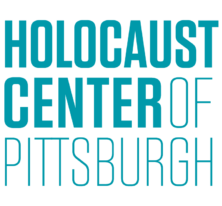
Photo by Brian Cohen
Profile by Amelia Twyman

A small Jewish market passed each day on the way to school. The comforting glimpse of a local synagogue accented with faded brick and religious memory. A quick “hello” to a friendly Jewish neighbor, respectable and polite. Sister Gemma Del Duca’s early childhood was characterized by these routine interactions with the Jewish community in her hometown of Greensburg, Pennsylvania.
Flash forward decades later and the passionate nun has made it her mission to unite Christian faith with Jewish spirit. Her commitment to protecting and studying Judaism has flourished into a heroic lifestyle, which is why she has been nominated as a Righteous Among the Neighbors recipient.
First, once-fleeting moments shared on the streets of Greensburg developed into intimate friendships with Jewish classmates in high school. From there came a years-long immersive experience living in Israel and studying Jewish scripture.
Today, Sister Gemma can be found at Seton Hill University, where she founded the National Catholic Center for Holocaust Education.
The center, established in 1987, aims to educate people about the Holocaust and its despicable causes, in an effort to prevent anti-semetic hate from rising again. It also works to strengthen Catholic-Jewish understanding, which Sister Gemma believes is vital when “guarding against any kind of antisemitism.”
“Young people [should be] studying and trying to learn more about Jewish history,” she said. “[By] having more dialogue and exchange between people and religions, [we can] be with the Jews in the event that anything happens.”
She became inspired to open the center at Seton Hill while living in Israel, where she spent 40 years learning about the importance of collaboration and unity across religious lines. When she temporarily returned home to the university in the summer of 1987, she brought her powerful discoveries straight to the principal, determined to distribute them across local grounds.
“I said, ‘Let us try to begin something, some small thing, a way to begin to get Catholics interested in studying the Holocaust.’ It was from those conversations that the center was born,” she said.
And born it was. Thirty-six years later, it continues to reveal lessons in combating antisemitism, lessons that, unfortunately, have proven to be applicable now more than ever.
Sister Gemma typically avoids listening to TV and radio on Shabbat, the Jewish day of rest, but she recalls one day in Oct. 2018 when exceptions were made.
“That Shabbat, people were telling me that something terrible had happened in Pittsburgh,” she said. “I was very anxious to know what this terrible tragedy was, and eventually, of course, they told me that a shooting had taken place at the synagogue.”
The nun gathered with both her fellow Sisters and members of the Jewish community in a Greensburg synagogue the morning after the shooting, where they discussed the event and comforted one another. She was shocked by the tragedy, by the notion that a human being could be filled with enough hate to fuel a gun.
“It was a dangerous signal of what seemed to be happening in our country,” she said. “We have to be very much aware of the fact that there are forces and there are people who have beliefs that are treacherous.”
Still, Sister Gemma’s work at the National Catholic Center for Holocaust Education offers a bit of light to counter these dark realities. Her studies of the Holocaust have helped her to better understand more recent tragedies because they reveal hateful patterns.
“Attacking a synagogue, for example, in this way, reminds [me] very much of Kristallnacht and of the terrible catastrophe of the burning of the synagogues that occurred in 1938, Germany and Austria,” she said. “Even though [Tree of Life] was an attack on one synagogue, it immediately stirs up the memory and the feelings and the harm that one witnesses in pictures or film.”
Through these parallels of past and present demonstration, she has been able to pinpoint effective means of fighting against evil, antisemitic forces. Her emphasis chiefly falls upon effort, dialogue and education among younger individuals. Directly interacting with Jews and taking time to learn about Jewish history can allow one to truly support the community–personal faith aside. Once people become familiar with Judaism, they can then actively recognize displays of antisemitism and speak out.
“People can speak lightly and joke around sometimes, [but] this can cause hurt to others,” Sister Gemma said. “We even hear [antisemitism] in ordinary speech and remarks, and I think we have to be strong enough to stand up and say ‘I do not agree with that kind of thinking.”
Because Jews are considered a minority, collective action must be taken and care must be administered across all religions. Sister Gemma also suggests getting to know a Jewish person directly, if possible. She feels “that it’s been a great blessing in [her] life to be able to have so many good friends who are Jewish.”
Though Sister Gemma preaches the importance of collective action, it is no secret that her individual accomplishments bring a special strength to the cause all on their own.
“We should be like a guard, protecting our Jewish brothers and sisters,” she said. “[Antisemitism] fails to give people the freedom to practice and to worship and to be as they wish to be, while love and respect is the strongest [way] to guard against that.”
